In the past we have documented the BBC’s limited coverage of the long-running maritime borders dispute between Israel and Lebanon.
In July 2011 the BBC News website published a report by Yolande Knell titled “Israel-Lebanon sea border dispute looms over gas fields”.
In May 2013 another report by Knell appeared under the title “Gas finds in east Mediterranean may change strategic balance” and was discussed here.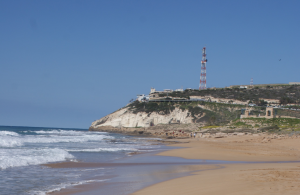
Subsequent developments in that story were ignored by the BBC for several years.
A BORDER DISPUTE BBC AUDIENCES KNOW NOTHING ABOUT
REVISITING A STORY THE BBC LAST MENTIONED IN 2013
In early October 2020 the BBC published a report titled “Lebanon and Israel to hold ‘historic’ maritime border talks” which was discussed here.
Two weeks later an article headlined “Lebanon and Israel hold talks on disputed sea border despite state of war” (discussed here) appeared on the BBC News website.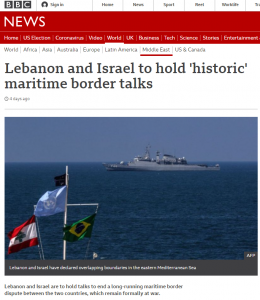
In June 2022 we noted that BBC audiences had not been informed of threats from Lebanon and Hizballah following the arrival of a floating gas production rig in the Karish offshore gas field:
SELECTIVE BBC REPORTING ON ISRAELI OFFSHORE GAS
The following month the BBC published a report titled “Israel shoots down Hezbollah drones heading for gas rig” (discussed here) which included the following portrayal of the maritime borders dispute that began in 2010:
“Tensions have mounted between Israel and Lebanon over ownership of the Karish gas field.
US energy envoy Amos Hochstein is mediating between the two countries to settle the longstanding dispute. Israel says the field lies within its UN-recognised exclusive economic zone, but Lebanon has also laid claim to parts of it.”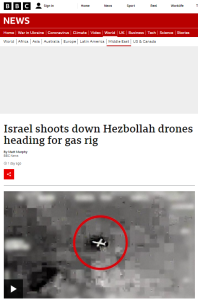
Later in July 2022 BBC Arabic published – and subsequently corrected – an inaccurate portrayal of the location of the Karish rig.
BBC audiences have clearly not been provided with the full range of information essential for proper understanding of this story, not least on the highly relevant topic of Lebanon’s changing demands.
A useful backgrounder published by the INSS in 2018 documents Lebanon’s rejections of proposed compromises, its augmented demands and its threats.
“Competition between rival political forces in Lebanon has always taken precedence over the national interest and caused much damage, including economic. Had the Lebanese government accepted the US compromise proposed in 2012, the Lebanese economy would have received a significant boost, and in turn would have benefited other regional economies. The American administration can minimize the risk of armed conflict by bringing Lebanon back to the idea of talking to Israel – even indirectly – about a fair compromise that would suit Lebanon.”
Another study published by the INSS in July 2022 provides useful updates and graphics:
“Until two years ago, the Karish field was not included in Lebanon’s exclusive economic zone, even according to the official stance of the Lebanese government. The following are a list of key developments in the mediation between Israel and Lebanon on this issue:
-
- In the first round of negotiations (2010-2012) between Israel and Lebanon on demarcation of the maritime border, conducted with American mediator Frederic Hof, Lebanon’s official stance put the maritime border with Israel at Line 23. This stance left a gap of 860 square kilometers between this line and the line of the Israeli official stance (point 1), which was at the heart of the dispute between the two countries. Line 23 was also given credence as the official stance of Lebanon as presented in letters to the United Nations in 2010-2011. Hof’s efforts came to naught as a result of Lebanon’s unwillingness to accept the compromise proposal he put forth that Israel accepted, whereby the disputed area would be divided between Lebanon (55 percent) and Israel (45 percent).
- Another round of negotiations was held in late 2020, this time in Naqoura, sponsored by the UN. In this round Lebanon toughened its stance and presented a new line further south (Line 29), which added an additional 1430 square kilometers to the territory in dispute and included a small part of the Karish field.
- The process of approving Line 29 as the official stance of Lebanon – as insisted on by Hezbollah – has not been completed and has no legal standing. Its final approval by the Lebanese government was frozen by President Michel Aoun, who prevented it from being brought to the Parliament for approval. The toughening of the Lebanese stance, which reflects this internal dispute, led to the cessation of talks in 2020.
- The Americans tried again in November 2021 and sent senior government energy adviser Amos Hochstein to mediate between the sides. After a number of consultations in Jerusalem and Beirut, Hochstein did not achieve any progress.”
The new Lebanese demands of 2020 have also been reported by Alma.
“It is difficult to ignore that the new Lebanese condition arose only after discovering the Karish gas field about 8 years ago in April 2020 and after understanding its ultimate production potential (about six months before the new Lebanese demand…). The gas field production potential contains 33.7 billion cubic meters (BCM) of natural gas.”
While some recent reports in the regional media suggest that progress is being made in the talks to solve the maritime borders dispute between Israel and Lebanon, others report a “reasonable possibility” of related confrontation between Israel and the Lebanese terrorist organisation Hizballah.
Whatever the eventual outcome, it is glaringly obvious that in relation to this long-running story, those getting their news from the BBC have not seen the “range and depth of analysis and content not widely available from other United Kingdom news providers” that the BBC is obliged to provide. In the event of any armed conflict, that chronic lack of information will of course compromise both public perceptions and future BBC reporting.

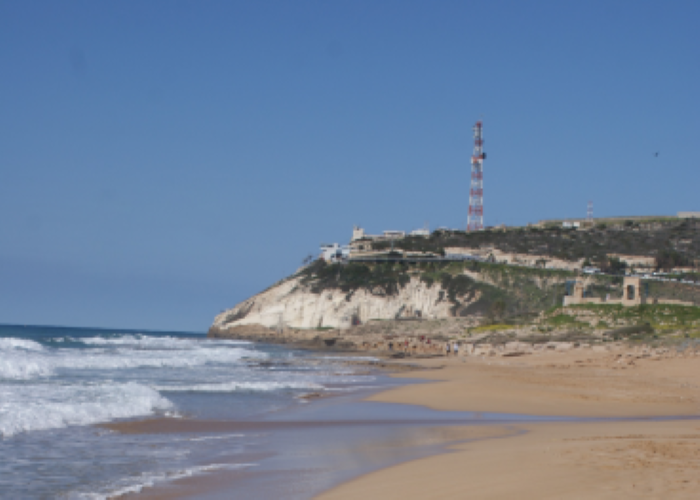

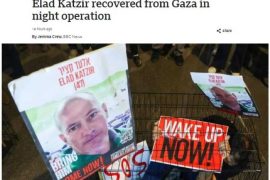
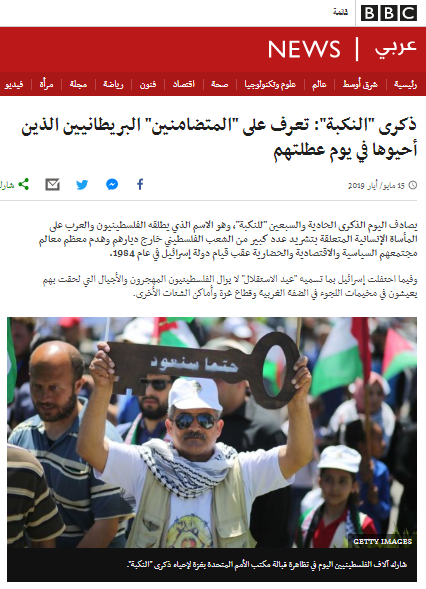

Lebanon is controlled by Hizbollah – which is controlled by Iran. So any reporting by the BBC Middle East “propaganda service” on the border issue will be biased against Israel for absolute certain. It’s as simple as that.